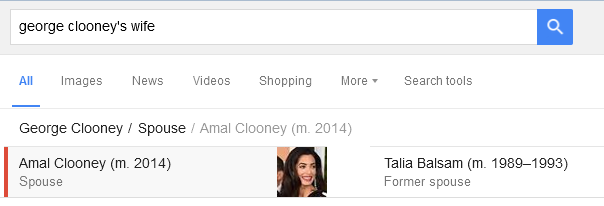Columnist Clay Cazier guides you through the basics of Wikidata, explaining what it is, why it matters to SEO professionals and how you can leverage it.

No doubt you have run across articles detailing the SEO benefits of structured data and how algorithms focused on things not strings are turning search engines into answer engines.
A quick example: search for “George Clooney’s wife,” and Google immediately tells you Amal Clooney is his current spouse (married in 2014) and Talia Balsam is his former wife, married and then divorced in 1989 and 1993 respectively.

In 2005, it is likely the top result would have been an organic listing featuring a website optimized for that particular query.
Today, Google’s ability to provide logical answers is rooted in the semantic connections provided by structured data entries across the web (like Wikipedia, Wikidata and the CIA Factbook) and within Google’s private Knowledge Vault.
Comprehensive, trusted sources of structured data provide a machine like Google with the entities that enable it to logically formulate an answer for common and not-so-common things (see also “RankBrain“).
“Congratulations,” you might say, “you are one of hundreds who have described the relationship between structured data, Google’s Knowledge Graph and modern search results.”
I’d like to add to this industry conversation by focusing on the basics of Wikidata — Wikidata 101, if you will — and discussing why the site should matter to SEO pros trying to increase their clients’ search visibility.
[Read the full article on Search Engine Land.]
Some opinions expressed in this article may be those of a guest author and not necessarily Marketing Land. Staff authors are listed here.









